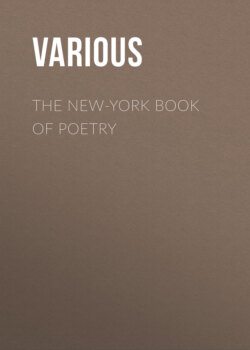Читать книгу The New-York Book of Poetry - Группа авторов - Страница 14
На сайте Литреса книга снята с продажи.
ADDRESS TO A MUSQUITO.
ОглавлениеTable of Contents
BY EDWARD SANFORD.
His voice was ever soft, gentle, and low.—King Lear.
Thou sweet musician, that around my bed Dost nightly come and wind thy little horn, By what unseen and secret influence led, Feed'st thou my ear with music till 'tis morn? The wind harp's tones are not more soft than thine, The hum of falling waters not more sweet, I own, indeed, I own thy song divine. And when next year's warm summer nights we meet, (Till then, farewell!) I promise thee to be A patient listener to thy minstrelsy.
Thou tiny minstrel, who bid thee discourse Such eloquent music? was't thy tuneful sire? Some old musician? or did'st take a course Of lessons from some master of the lyre? Who bid thee twang so sweetly thy small trump? Did Norton form thy notes so clear and full? Art a phrenologist, and is the bump Of song developed on thy little skull? At Niblo's hast thou been when crowds stood mute Drinking the birdlike tones of Cuddy's flute?
Tell me the burden of thy ceaseless song, Is it thy evening hymn of grateful prayer, Or lay of love, thou pipest through the long Still night? With song dost drive away dull care? Art thou a vieux garçon, a gay deceiver, A wandering blade, roaming in search of sweets, Pledging thy faith to every fond believer, Who thy advance with half-way shyness meets? Or art o' the softer sex, and sing'st in glee, "In maiden meditation, fancy free?"
Thou little Syren, when the nymphs of yore Charmed with their songs till men forgot to dine, And starved, though music-fed, upon their shore, Their voices breathed no softer lays than thine, They sang but to entice, and thou dost sing As if to lull our senses to repose, That thou may'st use, unharmed, thy little sting The very moment we begin to doze; Thou worse than Syren, thirsty, fierce blood-sipper, Thou living Vampyre, and thou Gallinipper!
Nature is full of music, sweetly sings The bard, (and thou dost sing most sweetly too,) Through the wide circuit of created things, Thou art the living proof the bard sings true. Nature is full of thee; on every shore, 'Neath the hot sky of Congo's dusky child, From warm Peru to icy Labrador, The world's free citizen thou roamest wild. Wherever "mountains rise or oceans roll," Thy voice is heard, from "Indus to the Pole."
The incarnation of Queen Mab art thou, "The Fairies' midwife;"—thou dost nightly sip, With amorous proboscis bending low, The honey dew from many a lady's lip— (Though that they "straight on kisses dream," I doubt) On smiling faces, and on eyes that weep, Thou lightest, and oft with "sympathetic snout" "Ticklest men's noses as they lie asleep;" And sometimes dwellest, if I rightly scan, "On the fore-finger of an alderman."
Yet thou can'st glory in a noble birth. As rose the sea-born Venus from the wave, So didst thou rise to life; the teeming earth, The living water, and the fresh air gave A portion of their elements to create Thy little form, though beauty dwells not there. So lean and gaunt, that economic fate Meant thee to feed on music or on air. Our vein's pure juices were not made for thee, Thou living, singing, stinging atomy.
The hues of dying sunset are most fair, And twilight's tints just fading into night, Most dusky soft, and so thy soft notes are By far the sweetest when thou tak'st thy flight. The swan's last note is sweetest, so is thine; Sweet are the wind harp's tones at distance heard; 'Tis sweet in distance at the day's decline, To hear the opening song of evening's bird. But notes of harp or bird at distance float Less sweetly on the ear than thy last note.
The autumn winds are wailing: 'tis thy dirge; Its leaves are sear, prophetic of thy doom. Soon the cold rain will whelm thee, as the surge Whelms the tost mariner in its watery tomb, Then soar, and sing thy little life away! Albeit thy voice is somewhat husky now. 'Tis well to end in music life's last day, Of one so gleeful and so blithe as thou: For thou wilt soon live through its joyous hours, And pass away with Autumn's dying flowers.
